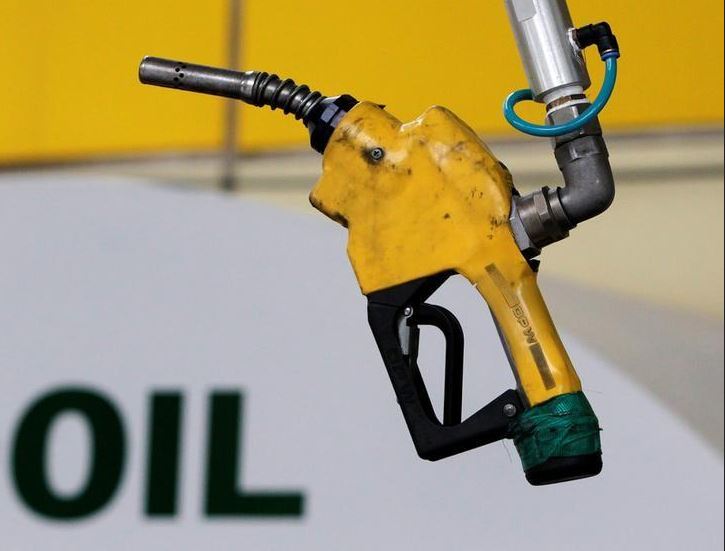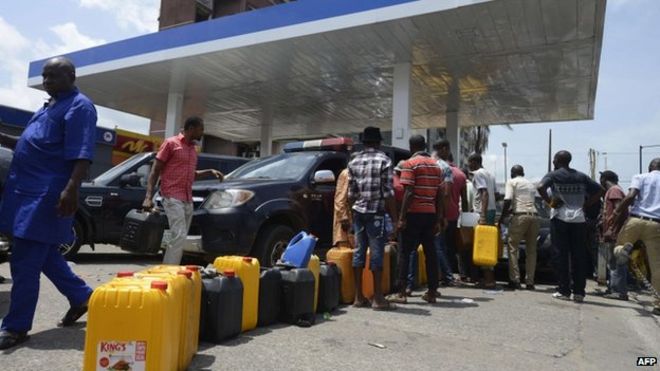The federal government Wednesday in Abuja, denied insinuations that the current fuel scarcity plaguing the country is a ploy to increase the pump price of petrol.
The government also ordered the Minister of State for Petroleum, Dr. Ibe Kachikwu, to ensure that the scarcity does not exceed this weekend.
Making this disclosure while answering questions from journalists at the end of Wednesday’s weekly Federal Executive Council (FEC) meeting in the State House, the Minister of Information, Alhaji Lai Mohammed, blamed the scarcity on higher demand for petroleum products in cold regions as a result of winter.

According to him, Kachikwu assured the council that there was enough petrol that could serve the country till the end of January 2018, adding that the council gave the minister a matching order to ensure that the scarcity disappears this weekend.
Mohammed also said Kachikwu promised that his team would work assiduously to put paid to the lingering fuel crisis with the assurance to the council that there is nothing to worry about.
He said: “No, the government has no intention at all to increase the pump price of petrol.
“Two, the minister assured the council that we have enough products till the next one month even till the end of January.
“Thirdly, this is winter period. There is always more demand for refined petroleum products during winter period in the colder countries. This is what we are experiencing now.
“Also, it has been the NNPC that has been importing, but he has assured [of adequate supply]. The council gave him a matching order that this fuel scarcity should not last beyond this weekend and they are going to work very hard to ensure that it is curtailed. He assured council that there is actually no cause for alarm.”‘
But in spite of the assurances by the federal government, there were indications that the fuel queues might linger following the decision of some oil trading companies to import diesel instead of petrol as stipulated in the Direct Sale-Direct Purchase (DSDP) contracts between the NNPC and some of the oil marketers, THISDAY has learnt.
THISDAY, however, gathered that the corporation has ordered massive importation of petrol to bridge the supply gap as two imported vessels are being expected to berth in Apapa, Lagos within the next 24 hours.
Also to address the shortfalls in supply in Lagos, the Department of Petroleum Resources (DPR) Wednesday ordered depot owners to give priority to tankers that supply product to filling stations within Lagos.
The deals, which were previously referred to as offshore crude oil processing agreements (OPAs) and crude-for-products exchange arrangements, are now known as DSDP agreements.
Under the latest DSDP scheme, the NNPC excluded the big players with strong footprints in the downstream sector such as Italy’s ENI, India’s Essar, Shell-BP, Forte Oil, Mobil (11Plc), Oando, Conoil, and NIPCO in an apparent move to empower smaller companies.
Even international oil trading giants such as Total, Vitol and Trafigura that made the list were allocated the same small volumes of crude – 33,000 barrels per day, with smaller Nigerian downstream players in the list.
THISDAY gathered that these oil traders engaged by the NNPC were supposed to bring back petrol into the country after taking crude oil to the international refiners.
It was, however, learnt that in the months of November/December, some of these companies converted their DSDP contracts into diesel as they could not bring back petrol as a result of the high cost of the product in the international market.
The implication, it was learnt, is that the market is flooded with diesel, which is also imported by the other private marketers as a deregulated product, while petrol, which other marketers lack capacity to import and have been relying on NNPC for supply, becomes a scarce product, leading to the current crisis.
A source at NNPC, who confirmed this development, told THISDAY that when petrol became expensive in the international market, some of the oil traders approached NNPC to convert their contracts to diesel and the corporation obliged their request.
The source explained: “Ordinarily, diesel is not supposed to be under the DSDP contracts because all the marketers import diesel since it is deregulated. The problem is petrol, which is not fully deregulated and not imported by the private marketers. Some of the companies engaged in DSDP agreements lack capacity and only execute the contracts when it is convenient for them.
When petrol was expensive, they requested the NNPC to change their contract to diesel and the market was flooded with diesel because all other marketers also import diesel. Now, there is shortage of petrol in the market because the NNPC, which should import petrol, mismanaged the DSDP by allowing the trading companies to import diesel instead of petrol.”
He explained that unless the NNPC reviews the DSDP and involves the big players, the supply gap may widen and linger till Christmas.
But in a swift response, the NNPC’s spokesman, Mr. Ndu Ughamadu, exonerated the DSDP scheme and told THISDAY that the crisis was as a result of the threat by the Independent Petroleum Marketers Association of Nigeria (IPMAN) to shut down filling stations on December 11.
“IPMAN has issues with the depot operators over ex-depot price. They issued a threat and people engaged in panic-buying. That is the cause of the crisis,” he said.
Speaking on the DSDP contracts, Ughamadu said the scheme had its own challenges like every other new concept but added that these challenges were not responsible for the current queues in some filling stations.
“The direct sale-direct purchase is a new concept to boost supply of petroleum products and ensure huge savings for the federal government. However, like every other new concept, it has its own challenges but these challenges are not responsible for the present crisis. There is enough petrol in the system. The crisis is caused by panic-buying. The Group Managing Director of NNPC, Dr. Maikanti Baru, has ordered for more cargoes. Right now, all NNPC stations in Abuja are dispensing product. So, in the next 48 hours, it will be over if people stop panic-buying,” Ughamadu explained.
THISDAY gathered that two imported vessels were being expected in Apapa in the next 24 hours.In a related development, the DPR has intensified its surveillance of depots to avert hoarding and profiteering by unscrupulous marketers, who might want to take advantage of the situation.
Speaking Wednesday when she led top officials of the agency to monitor depots in Lagos, DPR’s assistant director in charge of retail outlets’ monitoring the downstream division, Mrs. Ijeoma Otti-Onyeri, urged the public to stop panic buying.
“We are here because of the emergency situation in the country. The public is panic-buying because of speculations that there would be increase in price. The government has come out to say that there is no plan to increase price. So, the public should stop panic-buying,” she said.
She also urged the depot owners to give priority to Lagos since it was the state that experienced the queues.
Also speaking, the DPR’s Deputy Manager in charge of Retail Outlets and Marketing, at the Corporate Headquarters, Mr. Isa Ibrahim, charged the depot owners to sell at government’s approved price.

